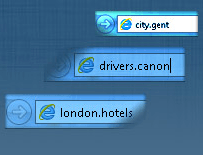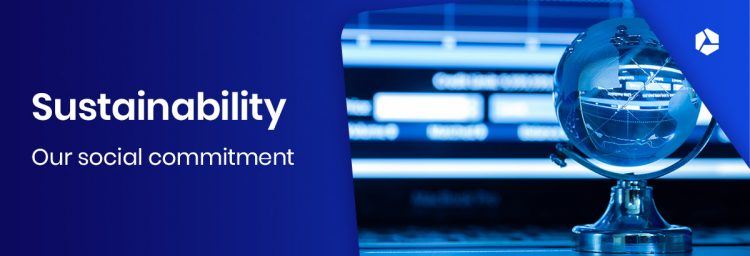Are you ready for your own Top Level Domain?
 By the end of 2012, the Internet will become a little bigger. Because then, the .com, .be, .net and almost three hundred other Top Level Domains – also called extensions – will get competition. For a short period of time, companies, organisations and communities will be given the opportunity to buy their own domain extension and, by doing so, to create a new location on the Internet. This means you will soon surf to .nyc and .apple sites. But .london will also be launched. This is not surprising: TLDs are a powerful marketing weapon for both companies and cities.
By the end of 2012, the Internet will become a little bigger. Because then, the .com, .be, .net and almost three hundred other Top Level Domains – also called extensions – will get competition. For a short period of time, companies, organisations and communities will be given the opportunity to buy their own domain extension and, by doing so, to create a new location on the Internet. This means you will soon surf to .nyc and .apple sites. But .london will also be launched. This is not surprising: TLDs are a powerful marketing weapon for both companies and cities.
What is a TLD?
A TLD is best compared to a private island on the web. Just as countries have one today, with their shortened name at the end of the URL (.be, .fr, .nl). And just as these countries make the rules in that zone, you will soon be able to do the same with your own TLD. You decide if you give addresses for free or if you sell them. Or you can also keep the whole zone for yourself and use it exclusively as a marketing channel.
What can a TLD do for you?
A Top Level Domain is interesting for cities and regions. Because, this way, they can build an entire ecosystem on the web. The URL flowershop.london, for instance, will soon become a choice address. Just as museums.london and goingoutin.london. This way, a city or region creates a real online extension to everything it has to offer. And it makes another step towards urban marketing.
But new TLDs also offer unique opportunities to companies. What do you think about www.apubwith.heineken? Or www.myownpageon.netlog? Or www.drivers.canon? Top Level Domains are marketing machines with plenty of potential. Will you give each customer its own domain? Will you sell the domain names? You decide!
The regulator expects minimum 500 applicants for a new domain extension. In this context, there are both open TLDs (that can be registered by the general public) and restricted TLDs. Until now, few trademark owners announced their intention to buy their own TLD. The reason is obvious: they fear competition… In the meantime, more generic domain extensions such as .music, .gay or .eco already rallied many followers and have been approved by various communities to claim their own domain extension. If there are multiple applicants, ICANN will hold an auction. Luckily, this does not apply to trademark holders and cities. Indeed, cities and trademark holders have the first right to claim their own name, but restrictions apply here too: confusion must be avoided and, according to ICANN, no extension can lead to consumer deception.
Be quick!
The procedure to get your own extension is complex. ICANN, manager and issuer of the top level domains, asks every applicant to submit their applications before 12 April. And that application file is an extensive document that has minimum 200 pages, because in this document, you need to describe what you plan to do with the domain and how you will meet the strict technical requirements.
This is why Combell launched Next TLD, a special division that handles the processing of the applications and guides companies, cities and regions through the steps to get their own TLD. This is what we currently do for the city of Ghent (.gent). In that context, we collaborate with specialists in that area to draw up the required business plan and the juridical foundations. Next TLD is a joint venture between Combell and Sensirius. Sensirius is one of the few European suppliers of registry software that meet the strict requirements that ICANN laid down for the new domain extensions.
What about the costs?
With a TLD, you get a part of the Internet, at the highest level: directly via the regulator. That, obviously, costs more than just renting 1 domain name.
ICANN asks applicants a one-time starting fee of 185,000 USD and, every next year, a yearly fee of 25,000 USD. Moreover, the TLD will only be approved once the technical infrastructure has been checked. Your zone must be available 24/7 worldwide and, of course, you also want to be able to automatically register domain names in your own zone. The costs of such software and hardware services start at 20,000 euros a year. However, this considerable amount of money is worth it if you take the possible return into consideration. Anyhow, for companies, to do nothing is not an option, because it is a fact that extensions such as .shop or .music will soon be launched. And you too will have to decide if you will register a domain name with these extensions – and thus give money to a third party and manager – or if you will claim your own island on the Internet.
For a clear and realistic picture and answers to important financial and fiscal questions, do not wait any longer and get in touch with Combell.


